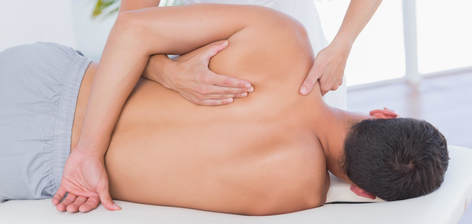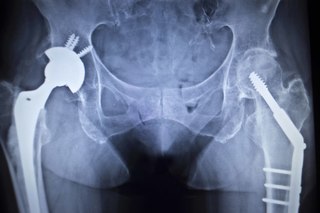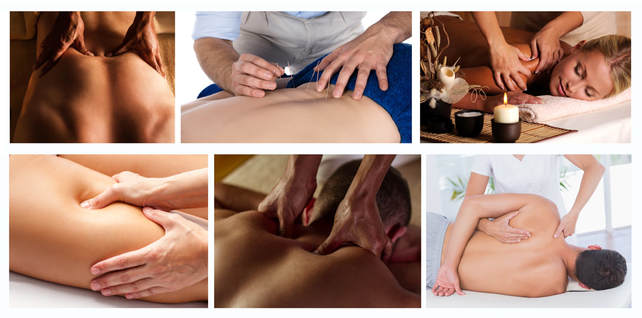Remedial Massage

At Gympie Massage & Rehabilitation, remedial massage is the treatment of choice for chronic pain and physical limitations. This style of massage holistically treats the body and focuses on the actual cause of the symptoms, simultaneously promoting homeostasis, i.e assisting the body's own repair mechanisms. Facilitating whole body healing while promoting long term health without the necessity of continually seeking symptomatic relief.
Key benefits of Remedial Massage include the stimulation to the blood supply allowing toxins in the muscles to be removed; the calming of the peripheral nervous system to ease pain and discomfort; and the toning and relaxing of muscles to improve joint mobility. An improvement to the health of the cells, the repairing of tissues, and the easing of stiffness and tension can also be experienced through muscle relaxation. Muscular and skeletal dysfunctions often addressed with Remedial Massage include Fibrositis, Spondylitis, Arthritis, muscular cramps, Whiplash, muscular atrophy, sports and dancing injuries....plus the list of conditions on the home page.
Key benefits of Remedial Massage include the stimulation to the blood supply allowing toxins in the muscles to be removed; the calming of the peripheral nervous system to ease pain and discomfort; and the toning and relaxing of muscles to improve joint mobility. An improvement to the health of the cells, the repairing of tissues, and the easing of stiffness and tension can also be experienced through muscle relaxation. Muscular and skeletal dysfunctions often addressed with Remedial Massage include Fibrositis, Spondylitis, Arthritis, muscular cramps, Whiplash, muscular atrophy, sports and dancing injuries....plus the list of conditions on the home page.
Below is an overview on the type of treatment available at Remedial Massage at Gympie Massage & Rehabilitation.
If you have ever had a remedial, sport, or deep tissue massage, you may be aware that you can be sore for a day or three afterwards.
As science catches up with clinical findings, it is now acknowledged that inflammation is no longer the enemy that has been portrayed by the pharmaceutical industry. No longer should NSAIDs [Non Steroidal Inflammatory Drugs] be considered as a first/best practice when presented with inflammation.
Harriet Hall states that “a number of buzz-words appear repeatedly in health claims, such as natural, antioxidants, organic, and inflammation.” Inflammation has been implicated in a number of chronic diseases, including diabetes, Parkinson’s, rheumatoid arthritis, allergies, atherosclerosis, and even cancer.
Inflammation has been demonized, and is usually thought of as a bad thing. But it is not all bad. Inflammation is part of the body’s response to infection and tissue damage, and it is crucial to the healing process.”
The brief view on inflammation:
· Inflammation is the body's attempt at self-protection to remove harmful stimuli and begin the healing process.
· Inflammation is part of the body's immune response.
· Infections, wounds, and any damage to tissue would not be able to heal without an inflammatory response.
· Chronic inflammation can eventually cause several diseases and conditions, including some cancers and rheumatoid arthritis . MORE HERE
Therefore, seek treatment, have the condition accurate diagnosed and stop chronic inflammation – without the harmful side effects of anti-inflammatory drugs [NSAIDs]. Read my article on NSAID’s effects.
Remedial therapy is effective - why then are there so many operations?
As science catches up with clinical findings, it is now acknowledged that inflammation is no longer the enemy that has been portrayed by the pharmaceutical industry. No longer should NSAIDs [Non Steroidal Inflammatory Drugs] be considered as a first/best practice when presented with inflammation.
Harriet Hall states that “a number of buzz-words appear repeatedly in health claims, such as natural, antioxidants, organic, and inflammation.” Inflammation has been implicated in a number of chronic diseases, including diabetes, Parkinson’s, rheumatoid arthritis, allergies, atherosclerosis, and even cancer.
Inflammation has been demonized, and is usually thought of as a bad thing. But it is not all bad. Inflammation is part of the body’s response to infection and tissue damage, and it is crucial to the healing process.”
The brief view on inflammation:
· Inflammation is the body's attempt at self-protection to remove harmful stimuli and begin the healing process.
· Inflammation is part of the body's immune response.
· Infections, wounds, and any damage to tissue would not be able to heal without an inflammatory response.
· Chronic inflammation can eventually cause several diseases and conditions, including some cancers and rheumatoid arthritis . MORE HERE
Therefore, seek treatment, have the condition accurate diagnosed and stop chronic inflammation – without the harmful side effects of anti-inflammatory drugs [NSAIDs]. Read my article on NSAID’s effects.
Remedial therapy is effective - why then are there so many operations?

The answer to that question may be supplied by Dr. Richard Deyo of Oregon Health and Science University. During the years 2002 to 2007, Dr. Deyo et al showed that surgery to correct narrowing of the spine did not increase overall. However, the rate of more complex procedures underwent an 18-fold increase. Unfortunately, the use of more complex procedures was linked to a higher rate of complications, a greater risk of death, and more than three times greater hospital charges. Since this surgical procedure has no proven benefit, its 18-fold increase is questionable at best, especially in regard to the added patient risk and the spiraling costs.
When questioned further, Deyo et al while reluctant to offer concrete answers, mentioned that medical device manufactures heavily promote the equipment required for the more complex procedures. Incidentally, the price of the more complex procedure can increase the per operational cost by $50,000. What is more, the surgeon is also paid more for the complex procedure, which reminds us of George Bernard Shaw's classic statement in The Doctor's Dilemma in 1911, "that if you pay a surgeon to cut off your leg, but don't pay him not to cut it off, don't be surprised if the fellow cuts off your leg."
Remember that we the public, place considerable pressure on doctors to give immediate relief from pain. It is not reasonable, as illustrated above in the statement by George Bernard Shaw, to expect surgeons to consider remedial massage as an alternative to surgery. Generally, that is the case. Generally, all health practitioners offer a solution based on their expertise.
RELIEF FROM MUSCULOSKELETAL PAIN - The techniques that are incorporated into Remedial Massage are almost always successful in treating muscular aches and pains. Whereas NSAIDs (Non Steroidal Anti Inflammatory Drugs) are often a band aid solution without offering anything permanent, except perhaps harmful side effects as reported by various Government agencies, the Lancet and other medical journals! In fact NSAID's such as Ibuprofen, interfere with the healing process.
Surgery on the other hand can be lifesaving, or dangerous as reported by Drs. Dean and Null et al. Obviously there are times when surgery is the only/best solution, such as in car accidents, when a bone needs pinning or a ruptured disc is pressing on the spinal cord or nerve. At Maleny Remedial Therapies, we recognise the difficulty in obtaining expert information that is based on results gained through practical experience and research. Given the range of success encountered in our work, you are encouraged to pursue all non-invasive treatment options before committing to surgery for musculoskeletal aches and pains.
Generally, you will obtain improvements in your condition after the first treatment. Although it is common that to attain long-term benefits, repeat treatments may be necessary. Nonetheless, should your condition stop improving before you are fully pain free, then remedial therapy alone is not the complete answer. In such cases it is necessary to offer further support to the correction process; be it peripheral neuropathy, sore lower back, rotator cuff problems, etc. In these cases it is necessary to stretch the tight/shortened muscles and strengthen the overstretched/antagonist muscles.
When questioned further, Deyo et al while reluctant to offer concrete answers, mentioned that medical device manufactures heavily promote the equipment required for the more complex procedures. Incidentally, the price of the more complex procedure can increase the per operational cost by $50,000. What is more, the surgeon is also paid more for the complex procedure, which reminds us of George Bernard Shaw's classic statement in The Doctor's Dilemma in 1911, "that if you pay a surgeon to cut off your leg, but don't pay him not to cut it off, don't be surprised if the fellow cuts off your leg."
Remember that we the public, place considerable pressure on doctors to give immediate relief from pain. It is not reasonable, as illustrated above in the statement by George Bernard Shaw, to expect surgeons to consider remedial massage as an alternative to surgery. Generally, that is the case. Generally, all health practitioners offer a solution based on their expertise.
RELIEF FROM MUSCULOSKELETAL PAIN - The techniques that are incorporated into Remedial Massage are almost always successful in treating muscular aches and pains. Whereas NSAIDs (Non Steroidal Anti Inflammatory Drugs) are often a band aid solution without offering anything permanent, except perhaps harmful side effects as reported by various Government agencies, the Lancet and other medical journals! In fact NSAID's such as Ibuprofen, interfere with the healing process.
Surgery on the other hand can be lifesaving, or dangerous as reported by Drs. Dean and Null et al. Obviously there are times when surgery is the only/best solution, such as in car accidents, when a bone needs pinning or a ruptured disc is pressing on the spinal cord or nerve. At Maleny Remedial Therapies, we recognise the difficulty in obtaining expert information that is based on results gained through practical experience and research. Given the range of success encountered in our work, you are encouraged to pursue all non-invasive treatment options before committing to surgery for musculoskeletal aches and pains.
Generally, you will obtain improvements in your condition after the first treatment. Although it is common that to attain long-term benefits, repeat treatments may be necessary. Nonetheless, should your condition stop improving before you are fully pain free, then remedial therapy alone is not the complete answer. In such cases it is necessary to offer further support to the correction process; be it peripheral neuropathy, sore lower back, rotator cuff problems, etc. In these cases it is necessary to stretch the tight/shortened muscles and strengthen the overstretched/antagonist muscles.
